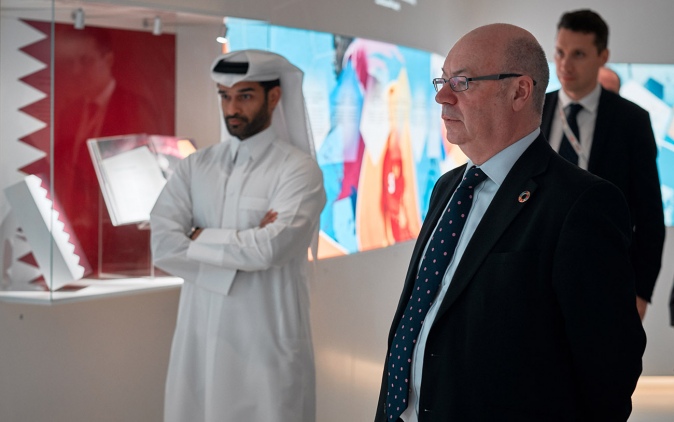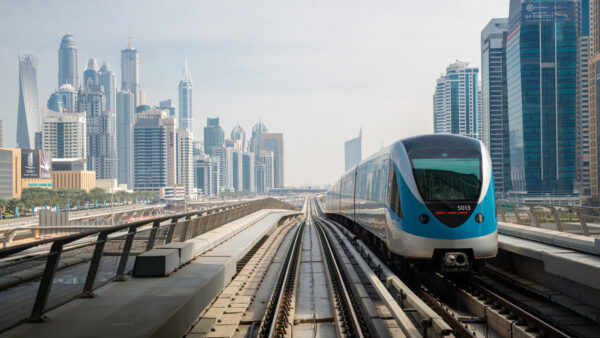British businesses hoping to cash in on £50m a week to be spent this year on new World Cup contracts in Qatar have been told they have to abide by strict labour laws to protect migrant workers.
The UK has formed a task force with the Doha government to ensure workers’ rights are upheld in the run up to the 2022 tournament.
Foreign Office minister Alistair Burt visited Qatar to ensure the British Embassy is overseeing any new contracts awarded to UK firms in a country that employs two million migrants.
The Middle East is being lined up as a place for the UK to do more business in the post-Brexit period.
Overall, the tiny Gulf State is spending £360m a week building up the World Cup infrastructure, including eight stadiums.
Of that, £51m relates to contracts due to be awarded this year, covering everything from the maintenance of new stadiums to CCTV installation, designing bus depots and a port redevelopment project.
It’s a trade bonanza British firms are hoping to tap.
Discussions between the Foreign Office and the Supreme Committee were held as the Doha government prepared to abolish the notorious kafala system of sponsored labour whereby workers need their employer’s permission to leave the country.
In practice, this has led to bosses withholding employees’ passports so they are unable to obtain a visa to return home.
The exit visa system has long been held up as an example of how the migrant workforce in Qatar – 95% of whom are from South Asia – are exploited.
But, according to union leaders, it is now on its way out of Qatar.

UK Minister for the Middle East, Alistair Burt (right) in Qatar with Hassan Al Thawadi, Secretary-General of the Supreme Committee for Delivery and Legacy (Supreme Committee)
The International Labour Organisation (ILO) is opening an office in Doha this week as part of a package of reforms which, as well as getting rid of exit visas, include the introduction of a minimum wage by the end of the year and a grievance procedure for workers.
During his visit to Qatar, Alistair Burt, who is Minister of State for the Middle East, was given progress updates on each of the eight tournament venues as well hearing about labour issues.
He said: “I was interested to hear from the Worker Welfare department about the work the Supreme Committee is doing to improve the situation for the workers on the sites, including through dispute resolution, inspections and technological developments.
“Football is a great way to bring people and cultures together and the UK offers support to Qatar as it hosts the first World Cup in the Arab World.”
An FCO spokesperson said yesterday: “We will continue to press the Qatari government to take further steps to tackle the problem of workers’ rights, and engage with the Qatari government on this issue. Qatar’s hosting of the 2022 World Cup is a major focus for the country, and is important for the UK’s prosperity.
“Staff at the British Embassy in Qatar meet the Supreme Committee, who are delivering the 2022 World Cup, on a regular basis.
“We will continue to support Qatar’s efforts in preparing for a successful FIFA World Cup 2022. This support includes assistance to Qatar’s continued efforts to implement labour reforms and ensuring that UK businesses involved adhere to international and Qatari labour laws.”
Even if abolished in Qatar, the kafala system will still affect 21 million migrant workers across the Middle East, in places like Saudi Arabia and the United Arab Emirates, where many are trapped in slave-like conditions when their wages are stopped and they are unable to leave because employers have held onto their paperwork.
Sharan Burrow, General Secretary of the International Trade Union Confederation said: “If these measures were implemented then Qatar will be a model to the other Gulf states.”
Amnesty International called on Qatar to introduce “a timetable for reform” and “urgently publish a robust and effective plan of action to remove the excessive restrictions that enable employers to trap migrant workers in exploitative situations”.
Top image: Workers at Qatar National Museum, Doha (Dreamstime)
- Freelance journalist Anthony Harwood is former foreign editor of the Daily Mail, and former Head of News at the Daily Mirror.






